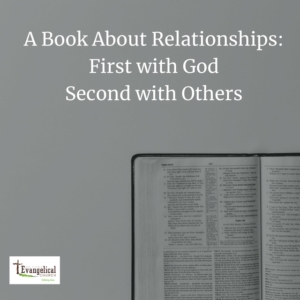Relate: Relationships from a Biblical Perspective – Week 3, Day 4
If you were to do an internet search on relationships you would almost find the vast majority of information is about romance, marriage, or sex. It just is the focus of our culture. It’s what our culture worships and glorifies.
The Bible: The Relationship Book
 It’s helpful for us to have a broader perspective on relationships. Robert Driskell in an article on what the Bible has to say about relationships writes,
It’s helpful for us to have a broader perspective on relationships. Robert Driskell in an article on what the Bible has to say about relationships writes,
The Bible is a book of relationships. It shows us what our relationship with God is meant to be and how we can have that kind of relationship. And it shows us how we should interact and treat our fellow Christians. It shows us how we are to view those who do not believe. Because we can see and touch the physical world around us, many times it seems more real than the spiritual world in which we connect and communicate with God. This means that sometimes we let our earthly relationships become more important than our relationship with God. [1]
The two great commandments help us keep our relationships ordered correctly. In Mark 12:30–31 Jesus says, 30 Love the Lord your God with all your heart and with all your soul and with all your mind and with all your strength.’ 31 The second is this: ‘Love your neighbor as yourself.’ There is no commandment greater than these.”
Loving God
The command to love God is found throughout the Bible (Deuteronomy 6:5, 13:3, 30:6; Matthew 22:37; Luke 10:27). Its challenging to love God because we can’t see him in the way that we can see the other people around us. As a result it’s easy for us to put our faith in other things or in the people around us. And yet there is no surer foundation for life than Jesus (1 Cor. 3:11, Matt. 7:24-28). This relationship is first and leads all of the rest of our relationships in life.
Love Your Neighbor
The command to love our neighbor is also found throughout the Bible ((Leviticus 19:18; Matthew 19:19, 22:39; Mark 12:31; Galatians 5:14; James 2:8). Interestingly, Jesus didn’t just mean the people that live across the street. He defined neighbor as anyone that we come across as we go on our way.
Husbands and Wives
The first human relationship in the Bible is found in Genesis 2:18 and following. God recognized that it wasn’t good for Adam to be alone. Yes, this verse speaks to the larger need of humanity. We were made for relationships. We were made for connection. The first relationship found in the Bible is the family. God chose to work through a family, and then later through another family (Abraham and Sarah) that would become a nation (Israel). Those families were chosen by God to bless every other family and nation in the world.
The purpose of the family is to be a blessing. I just talked to a man who bragged (in a good way) of 62 years of marriage. He said, “Divorce was never an option. Murder, maybe, but not divorce.” He said it with the kind of smile that said, “I’m joking, but there were times when it was hard.” Marriage is hard but good. One of the primary purposes of marriage is to honor and glorify God TOGETHER. In marriage, a husband and wife learn how to follow Jesus together and if they have children, raise a Godly lineage.
Others
Extended family, friends, and the community we live in follow these first two relationships. If a person isn’t married, then they can have a broader focus of care and service. The ultimate goal is to love others.
When it comes to other people who share our faith, the goal is to build each other up. Driskell writes, “The Holy Spirit living within believers empowers us to have a special relationship with one another that, at times, can be an incredibly special bond.” This relationship helps us to help each other follow God in a world that challenges our faith. Believers have a special bond because of Jesus. Jesus’s words in John 13:34–35 are, 34 “A new command I give you: Love one another. As I have loved you, so you must love one another. 35 By this everyone will know that you are my disciples, if you love one another.”
Others Who Don’t Share Our Faith
Believers have the responsibility of living good lives. Not for our sake. We live good lives as a way of pointing people toward Jesus. The Bible pictures it as “a light that shines in the darkness.” Before we talk about God, we let our lives talk.
We promote great marriages by working on our own marriages. And we exemplify service by getting out into the community and serving. Then we teach people about Godliness and goodness by being careful with our words, avoiding course talk and gossip. And the examples go on.
There should be a time when we are willing to share our faith. Simply asking friends and family members the question, “Would it be Ok for me to share my story with you?” is a great way to share our faith. We could follow the first question with a second, “Would you consider letting me tell you more about what it means to trust God?”
Romans 15:5–6
5 May the God who gives endurance and encouragement give you the same attitude of mind toward each other that Christ Jesus had, 6 so that with one mind and one voice you may glorify the God and Father of our Lord Jesus Christ.
Prayer Prompt:
Father God, please help me to know how to honor you in my relationships
[1]“What Does The Bible Say About Relationships? Is One More Important Than Another?.” Whatchristianswanttoknow.com. N. p., 2018. Web. 5 Oct. 2018. https://www.whatchristianswanttoknow.com/what-does-the-bible-say-about-relationships-is-one-more-important-than-another/#ixzz5T3pvidhZ


